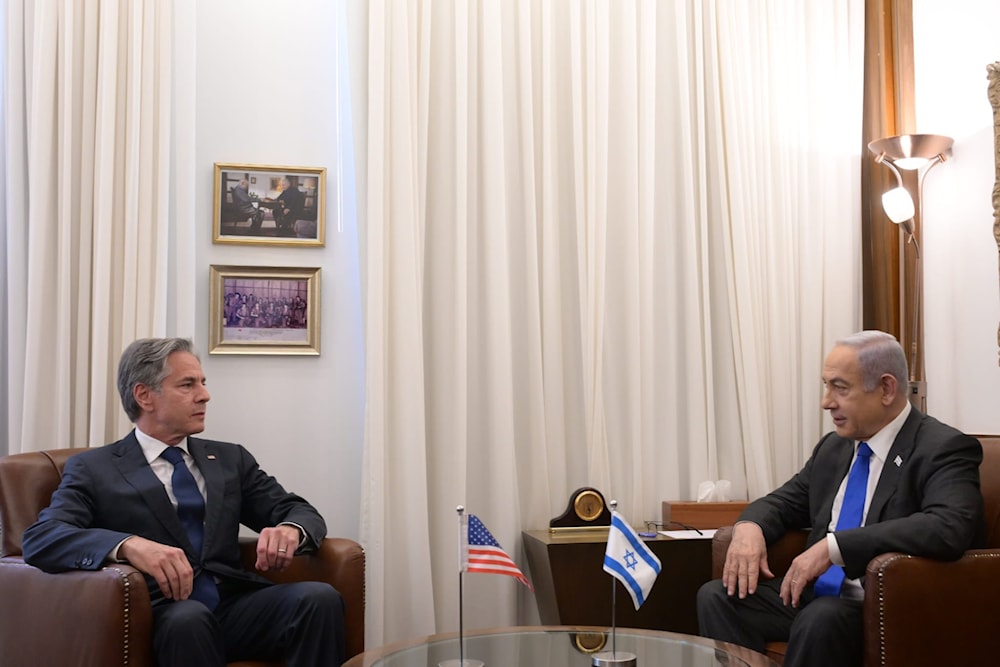Blinken to Netanyahu: Ceasefire deal can lead to calm in North
This development comes as part of efforts led by the US to push forth a ceasefire proposal that would see the release of all captives in exchange of a temporary ceasefire.
-

Israeli Prime Minister Benjamin Netanyahu and US Secretary of State Antony Blinken are holding talks at the Prime Minister's office in Occupied al-Quds, Palestine, June 10, 2024 (X, @sentdefender)
In a meeting on Monday with Israeli Prime Minister Benjamin Netanyahu, US Secretary of State Antony Blinken stressed the importance of a post-conflict plan in Gaza along with the necessity of preventing the war from spreading, the State Department said in a statement.
"He reiterated that the [ceasefire] proposal on the table would unlock the possibility of calm along Israel's northern border and further integration with countries in the region," the statement reads.
This development comes as part of efforts led by the US to push forth a ceasefire proposal that would see the release of all captives in exchange for a temporary ceasefire in fear of a regional escalation.
Following their meeting, Netanyahu's office published the following statement, "Prime Minister Benjamin Netanyahu, this evening, at the Prime Minister's Office in Jerusalem, is meeting with US Secretary of State Antony Blinken. Strategic Affairs Minister Ron Dermer, National Security Council Director Tzachi Hanegbi, and the Secretary of State's adviser, Derek Chollet, also participated in the meeting."
After the bilateral meeting, an expanded meeting will take place with the participation of Netanyahu's Chief-of-Staff Tzachi Braverman, Military Secretary Roman Grofman, Foreign Policy Advisor Ophir Falk, and Coordinator for the Captives and the Missing Gal Hirsch for the Israeli side, the statement said, adding that for the US side, the meeting will be attended by Assistant Secretary of State for Near Eastern Affairs Barbara Leaf, Special Envoy for Middle East Humanitarian Issues Lise Grande and Deputy Chief of Mission at the US Embassy in "Israel" Stephanie Hallett.
Read more: 'Israel' used captives to kill, starve Palestinians: UN expert
When US President Joe Biden initially announced the ceasefire proposal, it included clauses for a permanent ceasefire and the complete withdrawal of Israeli troops.
While this proposal earned favor from the Palestinian Resistance, it faced strong opposition from the Israeli side. However, the US later adjusted its proposal to accommodate Israeli conditions.
This resulted in a revised ceasefire proposal that appeared to heavily favor Israeli interests, raising concerns about its fairness and impartiality.
Under the revised plan, "Israel" would withdraw only from Gaza's populated areas but maintain a so-called "limited presence" in the Strip, while Hamas would agree to release all captives.
The ceasefire, initially slated for six weeks, could be extended as negotiations progress towards a lasting peace agreement.
Later today, the UN Security Council is slated to vote on a draft resolution put forth by the US, aimed at endorsing Washington's ceasefire proposal and calling upon Hamas to accept it.
Read more: Hamas, PIJ reaffirm stance on ceasefire conditions amid Blinken's bias

 3 Min Read
3 Min Read








